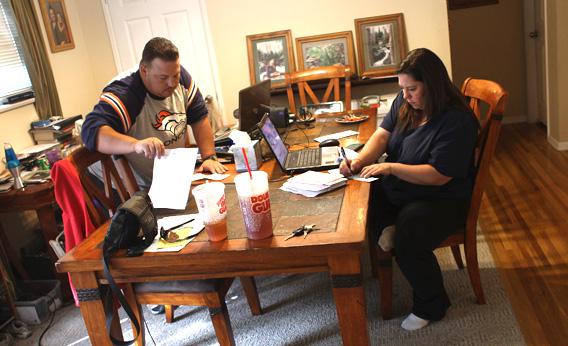When I meet people on airplanes and they find out I’m an economist, they usually ask about stock tips. When I explain I’m not that kind of economist, they next ask why we couldn’t predict the crisis. I’m not that kind of economist, either. Sometimes, they end with something about household budgeting—how do I know if I’m overspending on rent? I’m not really that kind of economist either—no academics are. But in this case, I think I might know more than the usual experts.
Most people who want to know about household budgeting turn to someone like Dave Ramsey, who has a carefully crafted household budgeting system. His, like many others, relies on a simple idea—sometimes called the “envelope system”—where you put your gas money in one envelope, your grocery money in another, etc., and spend only within a category.
This idea is clear and elegant—even if you don’t actually use an envelope, it seems like it could be easy to stick to, and it has a nice old-timey feel. There is a problem, though: It is in violation of basic economic principles.
The principle in question here is that “money is fungible.” In reality, all dollars are the same. There is no such thing as a gas dollar, a grocery dollar, a “fun” dollar. The Ramseys of the world argue you should just apportion them into the envelopes depending on what you think you might spend. But doing it this way is not actually the best way to dole out your money; you are not optimizing. Your money is just not working as hard as it should.
The system works great, as long as nothing ever changes. But the minute that some price changes, you’re in trouble. Here’s an extreme example. Imagine you drive to work, and your “gas money” envelope contains enough money to get you to work for the month, and maybe a little cushion. But then gas gets more expensive. You may first react by switching to a worse grade—say, from premium to regular (research shows many people do this). But if gas prices go up even more you simply will run out of money in the gas envelope. And then you won’t be able to get to work. Strictly following the envelope system here would be much, much worse than “cheating”: It’s certainly bad for your household budget if you miss work.
This example may seem perverse. After all, surely any reasonable person would move around some money in this situation and spend more on gas. But the thing is that lesser mistakes just like this are occurring every day with this system.
Example: You go to the store and milk is more expensive than usual (something about the sequester?) Because you have your limited grocery envelope, you have to respond to this by buying less of some grocery. You could buy less milk, or fewer veggies, or less pasta. However: It may very well be that you’d rather keep with your normal grocery purchase and cut back somewhere else—say, two fewer lattes this week. But because the “coffee” budget is separate from the grocery budget, you end up with the same number of lattes and fewer bananas.
Add up a lot of examples like this, and in the end what you buy may look very different from what you would buy if you thought about all of your dollars as interchangeable.
And the separate envelope mistake can really cost you. Usually, people have an envelope for savings—some amount you’ll commit to putting aside every month. Now imagine you overspend for Christmas and end up with $2,000 in credit card debt. You’ll plan to pay it down using the money in your monthly “gift” envelopes since, after all, you spent it on gifts. And now you’re carrying around credit card debt while still adding to your savings every month.
This is a huge mistake. Unless you are a much better investor than most of us, you’re probably collecting only a few percent interest on your savings account. And your credit card is likely charging in excess of 15 percent interest. The difference between paying down your credit card bill and adding to your savings could be hundreds of dollars over the year.
In fact, whether it’s due to the envelope system or something else, many, many people make a version of this last mistake. Research shows that the majority of people who carry credit card debt also have significant liquid savings, money which they could use to pay down their debt. One interpretation of why people do not do this is they think of their savings money as special—different—and don’t want to violate the sanctity of savings to pay down debt. But money is money is money, and if you make this mistake, you’ll end up with less of it.
So what to do? Dave Ramsey at least has some practical advice. All I have is criticism. In practice, some form of budgeting like this may be an easy way to track spending. But what economics tells us is that ultimately you should have your eye on the bottom line.
Case in point: A few months ago my in-laws were shopping for flights to visit us. They found flights, but wanted to wait a few days to buy them because my mother-in-law adheres to the policy of keeping her monthly credit card bill under a certain amount. They had to wait until the month rolled over—even though they were going to spend the money anyway. And when they went back, tickets were significantly more expensive. Adhering to budgeting rules shouldn’t trump good decision-making.
